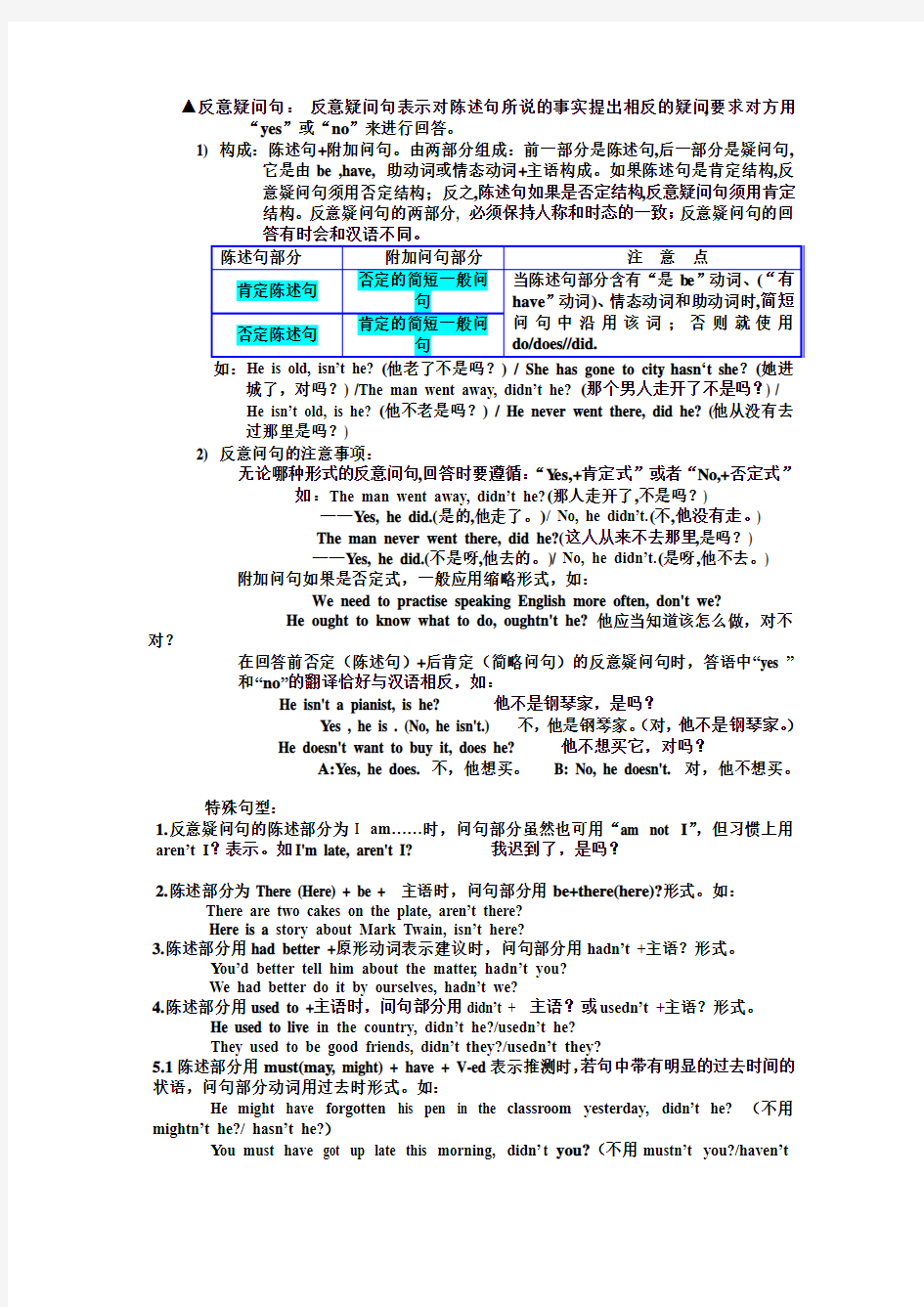反意疑问句

- 1、下载文档前请自行甄别文档内容的完整性,平台不提供额外的编辑、内容补充、找答案等附加服务。
- 2、"仅部分预览"的文档,不可在线预览部分如存在完整性等问题,可反馈申请退款(可完整预览的文档不适用该条件!)。
- 3、如文档侵犯您的权益,请联系客服反馈,我们会尽快为您处理(人工客服工作时间:9:00-18:30)。
▲反意疑问句:反意疑问句表示对陈述句所说的事实提出相反的疑问,要求对方用“yes”或“no”来进行回答。
1) 构成:陈述句+附加问句。由两部分组成:前一部分是陈述句,后一部分是疑问句,
它是由be ,have, 助动词或情态动词+主语构成。如果陈述句是肯定结构,反
意疑问句须用否定结构;反之,陈述句如果是否定结构,反意疑问句须用肯定
结构。反意疑问句的两部分, 必须保持人称和时态的一致;反意疑问句的回
城了,对吗?) /The man went away, didn‟t he? (那个男人走开了不是吗?) /
He isn‟t old, is he? (他不老是吗?) / He never went there, did he? (他从没有去
过那里是吗?)
2) 反意问句的注意事项:
无论哪种形式的反意问句,回答时要遵循:“Y es,+肯定式”或者“No,+否定式”
如:The man went away, didn‟t he?(那人走开了,不是吗?)
——Y es, he did.(是的,他走了。)/ No, he didn‟t.(不,他没有走。)
The man never went there, did he?(这人从来不去那里,是吗?)
——Y es, he did.(不是呀,他去的。)/ No, he didn‟t.(是呀,他不去。) 附加问句如果是否定式,一般应用缩略形式,如:
We need to practise speaking English more often, don't we?
He ought to know what to do, oughtn't he? 他应当知道该怎么做,对不对?
在回答前否定(陈述句)+后肯定(简略问句)的反意疑问句时,答语中“yes ”
和“no”的翻译恰好与汉语相反,如:
He isn't a pianist, is he? 他不是钢琴家,是吗?
Y es , he is . (No, he isn't.) 不,他是钢琴家。(对,他不是钢琴家。)He doesn't want to buy it, does he? 他不想买它,对吗?
A:Y es, he does. 不,他想买。B: No, he doesn't. 对,他不想买。
特殊句型:
1.反意疑问句的陈述部分为I am……时,问句部分虽然也可用“am not I”,但习惯上用aren‟t I?表示。如I'm late, aren't I? 我迟到了,是吗?
2.陈述部分为There (Here) + be + 主语时,问句部分用be+there(here)?形式。如:
There are two cakes on the plate, aren‟t there?
Here is a story about Mark Twain, isn‟t here?
3.陈述部分用had better +原形动词表示建议时,问句部分用hadn‟t +主语?形式。
Y ou‟d better tell him about the matter, hadn‟t you?
We had better do it by ourselves, hadn‟t we?
4.陈述部分用used to +主语时,问句部分用didn‟t + 主语?或usedn‟t +主语?形式。
He used to live in the country, didn‟t he?/usedn‟t he?
They used to be good friends, didn‟t they?/usedn‟t they?
5.1陈述部分用must(may, might) + have + V-ed表示推测时,若句中带有明显的过去时间的状语,问句部分动词用过去时形式。如:
He might have forgotten his pen in the classroom yesterday, didn‟t he? (不用mightn‟t he?/ hasn‟t he?)
Y ou must have got up late this morning, didn‟t you?(不用mustn‟t you?/haven‟t
you?)
5.2陈述部分用must(may, might) + have + V-ed表示推测时,若句中没有带明显的过去时间的状语,问句部分动词用现在完成时形式。如:
Everyone must have known the death of the waitress, haven‟t they? (不用mustn‟t they?)
Y ou must have worked there a year ago, didn‟t you?(不用mustn‟t you?/ haven‟t you?)
6.1陈述部分的主语为从句时,问句部分的主语一般用it代替,如:
What he said is true, isn't it? (不用didn‟t he?)
Where we will build the dam has not been decided yet, has it? (不用won‟t we?)6.2陈述部分的主语为动名词或不定式时,问句的主语用it代替。如:
T o do one good deed is easy for a person, isn't it? Skating is your favorite sport, isn't it?
7.陈述部分的主语是不定代词one,反义疑问句的主语可以用one,也可以用you。如:
One should be ready to help others, shuldn‟t one?
8.1陈述部分的主语为不定代词something, anything, nothing, everything时,问句部分的主语用it。如:
Something is wrong with the computer, isn‟t it?
Nothing has happened to them, has it?
8.2陈述部分的主语为不定代词somebody(someone), anybody(anyone), nobody(no one), everybody(everyone),no, none, neither时,问句部分的主语用he或they(通常用they),这时问句动词的数应和he或they一致。如:
Someone has taken the seat, hasn‟t he?
Everyone has done his best in the game, haven‟t they?
9.1。反意疑问句的陈述部分带有little, few, never, hardly, seldom,not,no,nobody,nothing, none, neither等否定意义的词时,问句部分用肯定式。如:
She never tells a lie, does she? (不用d oesn‟t she?)
He was seldom late, was he?(不用wasn‟t he?)
9.2.反意疑问句的陈述部分含有由un-, im-, in-, dis-, 等否定意义的前缀构成的词语时,虽意思是“不”,但疑问部分仍要用否定式
Y our father is unhappy, isn‟t he?(不能用is he?)
The man is dishonest, isn‟t he? (不能用is he?)
It is impossible to learn English without remembering more words, isn‟t it?(不能用is it ?)
10.1反意疑问句的陈述部分为I(We)第一人称think(believe, suppose, consider) + that从句时,问句部分的动词及主语与that从句内的动词和主语保持一致。如:
I think th at he has done his best, hasn‟t he?
We think that En glish is very useful, isn‟t it? (不用don‟t we?)
10.2.反意疑问句的陈述部分为I(We) don‟t think(believe, suppose, consider)+ that从句时,从句为否定意义,问句部分的动词和主语仍与that从句保持一致且用肯定式。如:
I don‟t think that you can do it, can you? (不用do I?)
We don‟t believe that the news is true, is it?(不用do we?)
10.3反意疑问句的陈述部分为非第一人称主语+ think(believe, suppose, consider) + that从句时,问句部分的动词和主语与陈述部分的主句动词和主语保持一致。如:They all think that English is very important, don‟t they? (不用isn‟t it?)
He didn‟t think that the news was true, did he? (不用wasn‟t/ was it?)
11.反意疑问句的陈述部分为主语+said( told, reported, asked……) + that从句时,问句部分的动词和主语与陈述部分的主句动词和主语保持一致。如:They said that you had finished your work, didn‟t they? (不用hadn‟t you)
Kate told you that she would go there, didn‟t sh e? (不用wouldn‟t she?)12.祈使句,祈使句后一般加上will you或won‟t you构成反义疑问句.祈使句是肯定式,表示“请求”,疑
